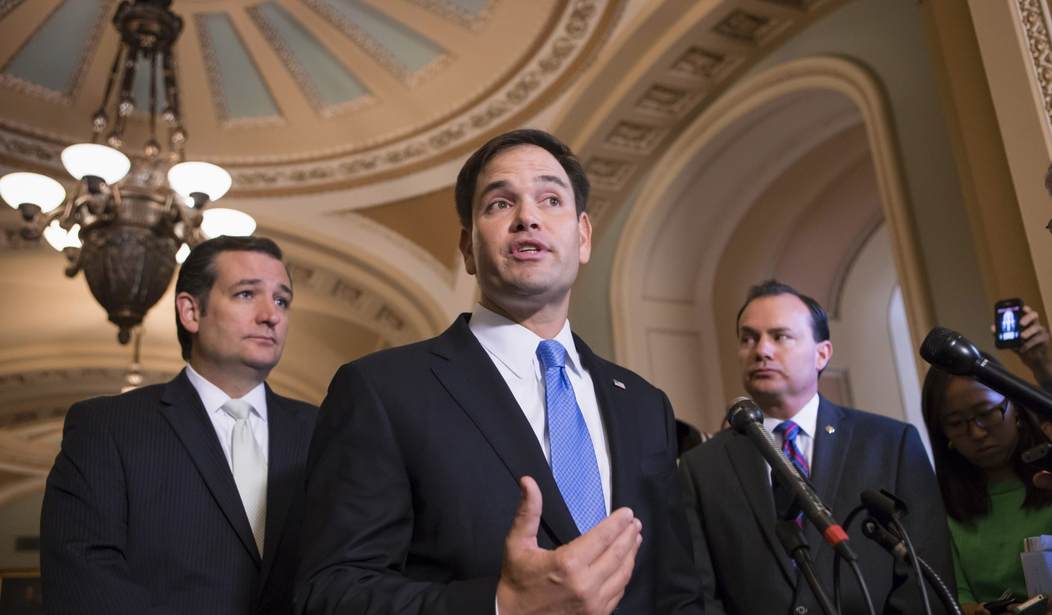Marco Rubio is leading the “Endorsement Primary” by a huge margin, but many are hard-pressed to name any of the Florida senator’s concrete accomplishments. While his record in the Senate may be scarce, Rubio has an impressive slate of achievements from his days in the Florida House, and these show what kind of conservative he would be in the Oval Office.
Rubio pushed many reforms, from limiting eminent domain to expanding school choice and education options for high-demand/high-skill jobs. His leadership also helped streamline Florida’s laws and even helped privatize toll roads.
“As speaker and in earlier leadership positions in the Florida House, Rubio demonstrated a willingness to delegate to focus on his strengths, communicating and negotiating,” National Review’s Jim Geraghty writes.
Donald Trump likes to say that Rubio has never hired anyone, and that may be true in the private sector. But in government, Rubio has much experience doing what presidents do: delegating.
One Hundred Ideas
When Rubio became speaker of the Florida House of Representatives in 2006, he gave every member of the group a book titled 100 Innovative Ideas for Florida’s Future. Rubio asked his fellow representatives to fill the books with ideas from constituents. This step may have been “flashy,” but it represented a governing philosophy — to involve voters and other legislators as much as possible.
Similarly, Rubio gave more power and responsibility to state House leaders when he became speaker. He let members of his leadership team decide which representatives would chair committees, and he let committee chairs skip the subcommittee step on important legislation. Committees were given broad leeway in how to prioritize different concerns with the money they were allocated.
In his autobiography An American Son: A Memoir, Rubio wrote:
Under my speakership, committee chairmen would have more power than ever before, but a greater share of the responsibility as well, and greater accountability.
Rubio explained his reasoning for expanding their authority:
I trusted the leaders I had chosen.
As any executive knows, selecting the right leaders for a project is supremely important, and it also helps to give project managers enough leeway to do their jobs effectively. Rubio has demonstrated these management skills in the Florida House, and he would bring them to the presidency.
Making Those Ideas Law
But Rubio did not just delegate authority and pick good leaders, he also passed important legislation that changed Florida for the better.
In 2010, Rubio’s campaign for U.S. Senate declared that 57 of the 100 ideas had become law. PolitiFact’s Aaron Sharockman examined this claim and found it “Half True.” Only 24 of the ideas were indisputably on the books in 2010, while 10 are considered “partially” law, with some kind of asterisk. While 34 out of 100 sounds like a pretty bad report card, it certainly refutes the idea that Rubio has “no accomplishments.”
Indeed, the book of ideas was still in use as a benchmark after Rubio left the state House in 2008. Former state Representative Dennis Baxely told PolitiFact:
The book framed a practical set of issues that the people had brought to us. … It gave us a platform to work from that was meaningful.
State Senator Don Gaetz, who worked with Rubio on education reforms in 2008 and helped him make four of the 100 ideas totally or “partially” law, said:
[E]ven still in 2010, as we put together health care and education bills, there will often be somebody, wryly or respectful, noting that what we’re doing is in the 100 Ideas book.
Rubio left a strong legacy.
Rubio’s Reforms
As speaker, Rubio achieved many goals — some more lofty than others. His leadership made Florida’s presidential primary come earlier in the 2008 presidential cycle, enabled drivers to purchase multiple-year vehicle registrations, and created an investment money pool for businesses and infrastructure projects.
One of the 100 ideas led to a requirement that school districts create career academies, where students can train for high-demand/high-need vocations. Another increased tax credits for companies that contribute to education scholarships, and another pushed the state’s assessment tests to later in the school year.
Rubio’s state House passed property insurance legislation in 2007, just two months after Rubio became speaker. The law created a uniform building code across the state, allowed flexibility to policyholders on hurricane deductibles, and mandated a “Truth in Premium Billing” statement for those policyholders.
Many of Rubio’s reforms are notable for conservatives who favor small-government reform. In 2007, the Florida state House created a Legislative Sunset Advisory Commission to review government efficiency and phase out outdated laws. The House also passed a law allowing the Florida government to lease out existing toll roads to private companies for up to 75 years, thus allowing the free market to run the roads by supply and demand. Rubio’s House also established a business investment program to encourage the creation of high-wage jobs.
Support for eminent domain, the process by which government can seize private property if it compensates the owner, has been one of Donald Trump’s greatest weaknesses when it comes to courting conservative voters. While in the state House, Rubio spearheaded laws restricting eminent domain in Florida.
Following the 2005 Supreme Court decision in Kelo vs. the City of New London, which formally gave governments the right to seize private property not just for infrastructure projects, but also for private developers, Rubio chaired a special committee which restricted this process in Florida. He sponsored both a law and a constitutional amendment on the issue, and both passed.
The Castle Coalition, a project of the Institute for Justice focused on the issue of private property rights and halting abuse of eminent domain, gave the state of Florida an “A” rating for Rubio’s reforms. As these passed in 2006, they were not part of Rubio’s 100 ideas, but they are an important accomplishment for conservatives nonetheless.
Caveats
Bear in mind that Rubio delegated the writing of some ideas to his fellow representatives and voters, so he might not have supported all of them.
Many of the ideas revolve around energy efficiency in a way that would stack the deck in support of “green” businesses at the expense of others. In 2008, a new law created an “Energy Efficiency Fund” which gives grants to public institutions to encourage them to develop “green” facilities. Also that year, Florida provided tax incentives to encourage homeowners and businesses to purchase purportedly energy-efficient products.
Laws like these stack the deck in favor of some businesses at the expense of others, and make the marriage of big government and big business even harder to break up. Some of the green energy goals, like striving to “lead the nation” in the development of alternative energy and incentives for alternative-fueled cars, did not become law.
In short, Rubio has many accomplishments to his name, and his leadership of Florida’s state House of Representatives demonstrates the virtues Americans look for in a president.








Join the conversation as a VIP Member